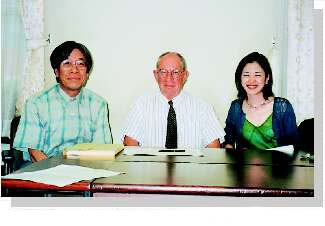

今回ご寄稿くださったLawrence Bartak先生は、オーストラリアのモナッシュ大学自閉症センター所長。自閉症の診断をご専門とされ、自閉症研究及び臨床の草分け的な存在です。先生は、九州大学人間環境学府附属発達臨床心理センターの外国人客員教授として、本年4月12日から7月13日まで在職されました。
I had had the good fortune to visit Japan on several occasions during the period 1978 to 1986 and very much appreciated the richness of Japanese culture, the beauty of the countryside and the stimulating contacts with professional colleagues in my field of special education and disability studies. Accordingly I was delighted to be invited to spend three months as a Visiting Professor at Kyushu University in the Center for Clinical Psychology and Human Development from April to July this year. This period was to be concentrated upon educational therapy of children and adolescents with autistic disorders.
It was particularly pleasant to be here as I knew of the high international prestige of Kyushu University and also I had not been in Japan since 1986 and had never been to Kyushu. When we arrived, it was still quite cold weather but we were very warmly welcomed by my colleagues at the Center and very quickly felt at home here, even though the environment and culture are very different from those of Australia. Staff at the Center went to great lengths to provide every possible facility needed for me to work efficiently in spite of the considerable problems of my having to work in English with students and staff and to maintain my research and consulting interests.
There are, of course, many big differences between Japan and Australia.
Australia is a very old country with a relatively new culture made up of people from many different original countries in Asia, Europe and Africa. Japan presented a great contrast as a relatively new, fertile and geologically recent land with a very old, rich and homogenous culture with a great many wonderful features. However, what has been most impressive has been the generosity and care extended to me both within the University and in the wider Japanese community throughout my stay.
 |
| 向かって左から、発達臨床心理センターの針塚教授、Bartak教授と針塚研究室の学生さん。 |
In Australia, the unique, heterogeneous nature of the society there frequently requires us to work professionally with families of children with disabilities whose cultural background is very different from the mainstream, essentially western cultural context.
This applies particularly to families from Asian or African cultures. Language difficulties in speaking about children’s problems with parents whose grasp of English is poor can be coped with through the assistance of skilled interpreters who are employed by hospital clinics and who have a good understanding of disability terminology apart from their language skills. However, cultural differences can affect understanding of relevant issues and professional staff need to understand the different ways people from other cultures perceive concepts such as disability, stress, possibilities of significant change in behaviour and individual family responsibility for securing services for children.
These are some of the special problems we experience in Australia in my field. It has therefore been very helpful to work in the same field in Japan where cultural values are quite different to those of Australia. Although they are somewhat similar to those of many of our Australian clients originating from Asian societies such as China or Vietnam, Japan and Australia are similar in other ways in that they are both developed, industrialized societies, far more so than Vietnam or rural parts of Chinese societies. These factors have made it very useful for me to experience approaches to disability here in Kyushu and I hope it has been useful to discuss these issues with graduate students and staff of Kyushu University during my stay here.
It has been most interesting and stimulating to compare and contrast research, teaching and professional practice in Japan and Australia in my field of work with autistic spectrum disorders and other patterns of developmental disability in children. Especially stimulating has been my experience of psychological therapeutic methods that are unique to Japan and initiated from Kyushu University in particular. It will be of considerable interest to colleagues in Australia when I return and discuss the innovations which I learned about while in Fukuoka. In return, I hope that I have made a contribution to graduate student’s and colleague’s understanding of the research and clinical practice that is current in Australian settings.
It has been interesting to discuss student’s research projects with them and it has been apparent that the graduate students in clinical psychology are highly skilled in both research and therapeutic techniques and comparable to the best students that we have in Australia.
Their grasp of relevant issues has been excellent and they have shown them selves to be sophisticated and sensitive practitioners in training in what is a most difficult area of research and practice. They represent a very valuable future professional resource for the benefit of the communities in Japan in which they will ultimately take up professional practice.
The research resources provided by Kyushu University to students and staff and myself are excellent and it has been very pleasant to be able to have all one’s professional needs satisfied most efficiently which in turn has given me the opportunity to make optimal use of my time here for the benefit of students and staff as well as myself and my colleagues in Australia. We have been able to develop the beginnings of student contacts between my university, others in Australia and Kyushu University and I look forward to strengthening and further developing these after my return to Australia. I will also be working to develop joint, cross-cultural research between ourselves and colleagues here at Kyushu University in the area of developmental disabilities.
I am very grateful to the University for the opportunity afforded to me to have this period as a Visiting Professor and for the kindness and cooperation shown by all staff and students during my stay here. I would like to wish all students and staff of the University very much success in the future and hope that I can maintain and build upon our contact after I return to Australia.